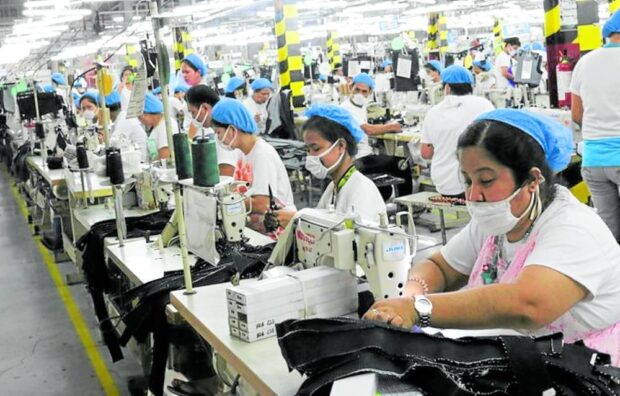
Workers in a factory at the Mactan Export Processing Zone (MEPZ) in Lapu-Lapu City, Cebu. (File photo from the Facebook account of the MEPZ Workers Alliance)
MANILA, Philippines — “Walang puso sa manggagawa.” (No compassion for the workers.)
That was how the militant labor group Kilusang Mayo Uno (KMU) on Tuesday described government officials and members of the House of Representatives who opposed a proposed P100 legislated wage hike.
On Monday, lawmakers in the lower chamber of Congress expressed concern that micro, small, and medium enterprises (MSMEs) would struggle if a Senate bill proposing the wage hike is enacted into law.
The KMU said using MSMEs as an excuse against a wage increase is already a “tired excuse.”
“Tomorrow is the day of hearts. But there are some government officials who have no heart for us laborers. They probably want workers to go hungry while big businesses gain billions in profit,” KMU Secretary General Jerome Adonis said in Filipino, as quoted in the group’s statement.
Albay 2nd District Rep. Joey Salceda explained on Monday that the wage hike could be a good policy if it would apply only to big companies and not MSMEs, as larger corporations could afford additional employees’ pay.
Adonis said there could be other solutions, including a wage subsidy from the government to aid MSMEs in paying their workers.
“There are more laborers working for big corporations in comparison to MSMEs. In fact, other than a wage hike, we are also campaigning for a wage subsidy so the government can assist small businesses to give the additional wages,” Adonis explained.
He further stressed that instead of bickering over Charter change, the two chambers of Congress must unite to enact a national minimum wage based on family living wage levels.
Economics of wage hike
On February 7, Senate Bill No. 2534, which seeks a P100 daily minimum wage hike for private sector workers, reached the Senate floor.
Labor leader and lawyer Sonny Matula lauded the move, saying that increasing laborers’ wages would give them more purchasing power, further stimulating the country’s economy and may combat inflation.
But Marikina 2nd District Rep. Stella Quimbo, an economics professor, explained that the proposed wage increase might instead cause a cost-push inflation since companies would only make their goods more expensive to cover the increased expense of paying their employees.
Matula, however, said that the slowdown of inflation in January 2024 is directly related to the decrease in the country’s unemployment rate in December of last year, explaining that higher wages mean more demand for goods in local markets since more people can afford them.
Currently, the daily minimum wage of non-agriculture workers in Metro Manila is P573 to P610, according to the latest data from the Department of Labor and Employment-National Wages and Productivity Commission.
Their pay would increase to around P700 if the Senate bill is enacted into law.